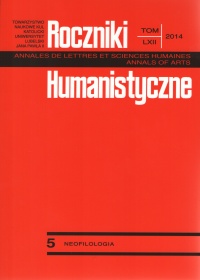Linguistic Analysis of Vesre of Buenos Aires
Abstract
The mechanism of reversing the order of the syllables of a word to forge a new word is known in many languages. We can enumerate French verlan, English back slang and Spanish vesre; i.e. a certain way of speaking typical of Buenos Aires. The purpose of this study is to present a linguistic analysis of this phenomenon based on dictionaries of José Gobello, Marcelo Oliveri and Oscar Conde, as well as on the tango lyrics that reflect the way of speaking of the inhabitants of Buenos Aires who employ words that belong to lunfardo and vesre.
References
Barcia, Pedro Luis, y Pauer, Gabriela (2010). Diccionario fraseológico del habla argentina. Frases, dichos y locuciones. Buenos Aires: Emecé. (DFHA)
Conde, Oscar. (20042 [1998]). Diccionario etimológico del lunfardo. Buenos Aires: Taurus. (DELOC)
Dellepiane Cálcena, Carlos (2007). Léxico del dinero. Buenos Aires: Academia Argentina de Letras. (AALLEXDIN)
Fontanella de Weinberg, María Beatriz (1986). El español bonaerense. Cuatro siglos de evolución lingüística. Buenos Aires: Hachette.
Fontanella de Weinberg, María Beatriz (2004). El español de la Argentina y sus variedades regionales. Bahía Blanca: El Proyecto Cultural Weinberg / Fontanella.
Gobello, José, y Oliveri, Marcelo (2010). Novísimo diccionario lunfardo. Buenos Aires: Corregidor. (NDLJG)
Nowikow, Wiaczesław (1996). Fonetyka hiszpańska. Warszawa: PWN.
Plager, Federico (coord.) (2008). Diccionario integral del español de la Argentina. Buenos Aires: Tinta Fresca–Voz Activa. (DIEA)
Copyright (c) 2014 Roczniki Humanistyczne

This work is licensed under a Creative Commons Attribution-NonCommercial-NoDerivatives 4.0 International License.





